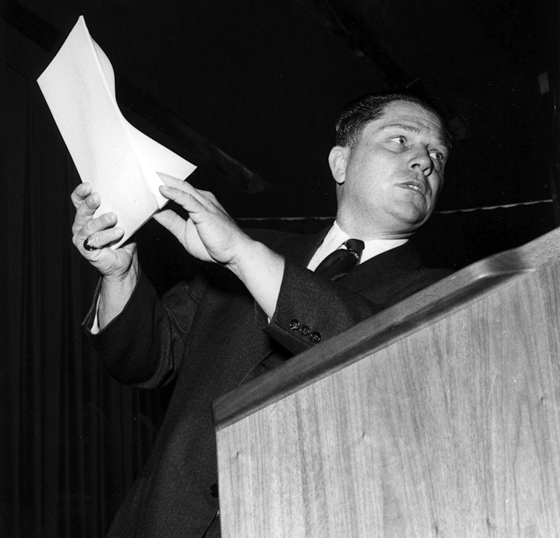Uncategorized
A New Chapter

A cardinal rule for the labor movement, and for life in general, is that one must study the past in order to prepare for the future.
Over the years, the Teamsters Union has been privileged to call some very remarkable men and women Teamsters. The stories of their lives, their struggles, sacrifices and achievements helped build the foundation of the union and helped make North America a better place for all of us.
Now those stories are available to you in more ways than ever.
The Teamsters History Project, an expansion of the 100th anniversary celebration held in 2003, is an educational program designed to teach Teamster members about the legacy of their union and to give them a broader view of the role the union played in the shaping of the United States.
A part of that project is an ongoing history book series which includes biographies, photo collections and stories surrounding major events and issues.
So far, the union has released 15 books through the Teamsters History Project, and many of them are now available as ebooks and audiobooks. The books had a limited print run and members could get them through their locals. The books proved so popular, though, that the union needed to find a way to get them into member hands.
Now that they are available as ebooks, they are even free on most platforms. The books are meant to educate people about the union’s past to better understand how the Teamsters raised the standard of living for so many workers and their families. This is especially important today as workers are facing economic and job-related hardships similar to what their grandparents and great-grandparents struggled with in eras past. Taking time to study people and events from the past gives members a way to recapture the original aspirations of the union.
The series covers a wide range of topics from social justice and civil rights to community service, disaster relief and political activism, all through the eyes of members who dealt with these issues at the time.
All of the books in the series show the humanity and true spirit of Teamster leaders who are often relegated to history as two-dimensional characters, forgetting the integral role they played in improving the lives of working families.
The Teamsters History Project, through the book series and other activities and events, shows how important it is to meld future vision with historical context in hopes of reinvigorating the membership and creating a revival in the labor movement.
Teamster stories need to be told and appreciated. That is why the union developed the Teamster History Collection, a series of Teamster biographies and accounts of major milestones in the union’s history.
The books take a closer look at the individuals and events that played a significant role in creating the Teamsters Union we know today.
The actions of Teamsters throughout history have made the union a truly inclusive one—something all Teamsters can take pride in.
The Teamsters Union invites you to join in the celebration of its heritage and learn from its legacy.
Oats and Roses
Newest Teamster Release is Children’s Book
In 1910. Teamsters in Seattle went on strike to protect their partners—the horses who pulled their delivery wagons.
When their employer, the Seattle Transfer Company, tried to stop the horses from having their noon feeding, the Teamsters stopped working in protest. They even filed a complaint with the National Humane Society.
The strike was successful and the horses’ lunch breaks were saved. And now, more than 100 years later, the Teamsters Union has released a children’s book celebrating that struggle.
“Oats and Roses: Teamsters Strike to Protect Thunder and Lightning,” was released in 2015.
“According to the men, the company has always put a feed bag in the wagons for the noon ‘lunch’ of the horses. The men claim that the company has now dispensed with the noon feed bag and that the horses are forced to work through the day without feeding. It was for this reason that the men walked out” on strike, according to a Los Angeles Herald report on the incident.
“The claim of the drivers was that to deprive the horses of their noon meal was inhuman,” reported The Labor Digest in January 1911.
Teamster history books are available online at teamster.org/books or for your Kindle, Nook or other e-reader!